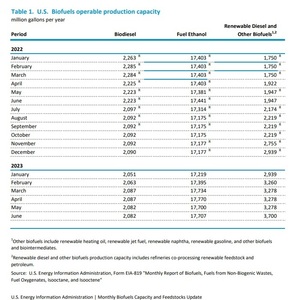EIA: Biofuel capacity, feedstock use up in June

November 22, 2023
BY Erin Krueger
U.S. operable biofuels capacity was up in June, with gains for both ethanol and renewable diesel and associated fuels, according to data released by the U.S. Energy Information Administration on Aug. 31. Feedstock consumption was also up during the month.
Total operable biofuels production capacity reached 23.489 billion gallons in June, up 429 MMgy when compared to the 23.06 billion gallons of capacity reported for the previous month. Capacity was up 1.878 billion gallons when compared to the 21.611 billion gallons of capacity in place as of June 2022.
Capacity for renewable diesel and associated biofuels, including renewable heating oil, renewable jet fuel, renewable naphtha, renewable gasoline, and other biofuels and biointermediates, reached 3.7 billion gallons in June, up 422 MMgy when compared to May and up 1.753 billion gallons when compared to June of last year.
Fuel ethanol capacity reached 17.707 billion gallons in June, up 7 MMgy when compared to the previous month and up 266 MMgy when compared to the same month of 2022.
Advertisement
Advertisement
Biodiesel capacity was at 2.082 billion gallons in June, a volume maintained from the previous month. When compared to June 2022, biodiesel capacity was down 141 MMgy.
U.S. biofuel producers consumed approximately 27.883 billion pounds of feedstock in June, up 248 million pounds when compared to May and up 617 million pounds when compared to June 2022.
U.S. biofuel producers consumed 24.756 billion pounds of corn in June, up from 24.585 billion pounds in May, but down from 24.860 billion pounds in June of last year. Sorghum consumption fell to 247 million pounds, down from 258 million pounds the previous month and 408 million pounds in June 2022.
Biofuel producers consumed 1.207 billion pounds of soybean oil in June, including 627 million pounds consumed by biodiesel plants and 580 million pounds consumed by renewable diesel facilities. Soybean oil consumption was at 1.141 billion pounds in May, including 663 million pounds consumed by biodiesel plants and 478 million pounds consumed by renewable diesel facilities; and at 810 million pounds in June 2022, including 560 million pounds consumed for biodiesel production and 250 million pounds consumed to produce renewable diesel.
Biofuel producers also consumed 546 million pounds of yellow grease, 256 million pounds of beef tallow, 71 million pounds of white crease, and 12 million pounds of poultry fat in June, compared to 648 million pounds, 229 million pounds, 63 million pounds, and 10 million pounds, respectively, in May and 425 million pounds, 172 million pounds, 58 million pounds, and 9 million pounds, respectively, in June 2022.
Advertisement
Advertisement
The EIA also noted that 69 million pounds of feedstock classed as “other” recycled feeds and wastes went to biofuel production in June, compared to 68 million pounds in May and 74 million pounds in June of last year. The agency withheld data on feedstocks classified as “other” waste oils, fats and greases, “other” vegetable oils and “other” feedstocks not elsewhere specified or identified in order to avoid disclosure of individual company data.
Additional information is available on the EIA website.
Related Stories
The U.S. Department of Energy’s Office of Energy Efficiency and Renewable Energy is soliciting public comments on a preliminary plan for determining provisional emissions rates (PER) for the purposes of the 45Z clean fuel production credit.
On July 17, Iowa’s cost-share Renewable Fuels Infrastructure Program awarded $1.12 million in grants for 20 applicants to add B11 and 4 applicants to add E15 to retail sites. This was the first meeting following the start of RFIP’s fiscal year.
Par Pacific Holdings Inc., Mitsubishi Corp. and ENEOS Corp. on July 21 announced the signing of definitive agreements to establish Hawaii Renewables LLC, a joint venture to produce renewable fuels at Par Pacific’s refinery in Kapolei Hawaii.
A new study published by the ABFA finds that the U.S. EPA’s proposal to cut the RIN by 50% for fuels made from foreign feedstocks, as part of its 2026 and 2027 RVOs, could stall the growth of the biomass-based diesel (BBD) industry.
The U.S Department of Energy Bioenergy Technologies Office, in partnership with the Algae Foundation and NREL, on July 21 announced the grand champion and top four winning teams of the 2023 - 2025 U.S. DOE AlgaePrize Competition.
Upcoming Events










